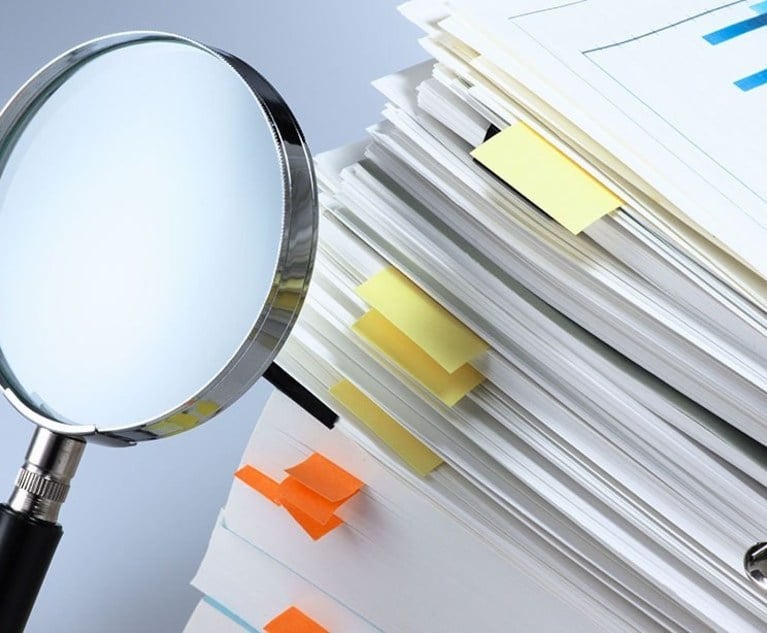Right To Seek Appropriate Post-Judgment Discovery From a Judgment Debtor's Lawyer Is Firmly Established
Respectfully, the 'Astraea' ruling is wrong and should not be followed.
January 13, 2023 at 11:00 AM
3 minute read
 In a Dec. 22, 2022, column, "Law Firms Are Not Just 'Any Person,'" the authors discuss a ruling made in Astraea N.Y. City v. Rivada Networks, 592 F. Supp. 3d 181 (S.D.N.Y. March 22, 2022), where the District Court judge quashed a routine post-judgment information subpoena served on counsel for the judgment debtor.
In a Dec. 22, 2022, column, "Law Firms Are Not Just 'Any Person,'" the authors discuss a ruling made in Astraea N.Y. City v. Rivada Networks, 592 F. Supp. 3d 181 (S.D.N.Y. March 22, 2022), where the District Court judge quashed a routine post-judgment information subpoena served on counsel for the judgment debtor.
The court held that although post-judgment discovery can under New York and federal law be sought from "any person," that term in its view "would not ordinarily be taken as including 'any law firm' nor does it say 'or that person's lawyers.'" The court concluded that the words "'any person' [do not] overcome the force and value of the policy that the lawyer may not reveal the confidences of her client, even though the client himself may well be compelled to disclose them …. The prospect that after judgment is entered the successful party could discover from the losing attorney things that attorney had learned would inject uncertainty into the whole course of her representation and the trial."
Respectfully, the Astraea ruling is wrong and should not be followed. The right to seek appropriate post-judgment discovery from a judgment debtor's lawyer is firmly established under New York law, which the District Court in Astraea overlooked. (The court ruled summarily based upon letter submissions that did not cite any helpful precedent.)
This content has been archived. It is available through our partners, LexisNexis® and Bloomberg Law.
To view this content, please continue to their sites.
Not a Lexis Subscriber?
Subscribe Now
Not a Bloomberg Law Subscriber?
Subscribe Now
NOT FOR REPRINT
© 2025 ALM Global, LLC, All Rights Reserved. Request academic re-use from www.copyright.com. All other uses, submit a request to [email protected]. For more information visit Asset & Logo Licensing.
You Might Like
View All
Attorney Responds to Outten & Golden Managing Partner's Letter on Dropped Client
3 minute read
Letter to the Editor: Law Journal Used Misleading Photo for Article on Election Observers
1 minute read
NYC's Administrative Court's to Publish Some Rulings in the New York Law Journal Is Welcomed. But It Should Go Further
4 minute readLaw Firms Mentioned
Trending Stories
- 1Pro Hac Vice in Georgia: Rule Change for Nonresident Attorneys
- 2The Benefits of E-Filing for Affordable, Effortless and Equal Access to Justice
- 3AI and Social Media Fakes: Are You Protecting Your Brand?
- 4A Primer on Using Third-Party Depositions To Prove Your Case at Trial
- 5‘Catholic Charities v. Wisconsin Labor and Industry Review Commission’: Another Consequence of 'Hobby Lobby'?
Who Got The Work
J. Brugh Lower of Gibbons has entered an appearance for industrial equipment supplier Devco Corporation in a pending trademark infringement lawsuit. The suit, accusing the defendant of selling knock-off Graco products, was filed Dec. 18 in New Jersey District Court by Rivkin Radler on behalf of Graco Inc. and Graco Minnesota. The case, assigned to U.S. District Judge Zahid N. Quraishi, is 3:24-cv-11294, Graco Inc. et al v. Devco Corporation.
Who Got The Work
Rebecca Maller-Stein and Kent A. Yalowitz of Arnold & Porter Kaye Scholer have entered their appearances for Hanaco Venture Capital and its executives, Lior Prosor and David Frankel, in a pending securities lawsuit. The action, filed on Dec. 24 in New York Southern District Court by Zell, Aron & Co. on behalf of Goldeneye Advisors, accuses the defendants of negligently and fraudulently managing the plaintiff's $1 million investment. The case, assigned to U.S. District Judge Vernon S. Broderick, is 1:24-cv-09918, Goldeneye Advisors, LLC v. Hanaco Venture Capital, Ltd. et al.
Who Got The Work
Attorneys from A&O Shearman has stepped in as defense counsel for Toronto-Dominion Bank and other defendants in a pending securities class action. The suit, filed Dec. 11 in New York Southern District Court by Bleichmar Fonti & Auld, accuses the defendants of concealing the bank's 'pervasive' deficiencies in regards to its compliance with the Bank Secrecy Act and the quality of its anti-money laundering controls. The case, assigned to U.S. District Judge Arun Subramanian, is 1:24-cv-09445, Gonzalez v. The Toronto-Dominion Bank et al.
Who Got The Work
Crown Castle International, a Pennsylvania company providing shared communications infrastructure, has turned to Luke D. Wolf of Gordon Rees Scully Mansukhani to fend off a pending breach-of-contract lawsuit. The court action, filed Nov. 25 in Michigan Eastern District Court by Hooper Hathaway PC on behalf of The Town Residences LLC, accuses Crown Castle of failing to transfer approximately $30,000 in utility payments from T-Mobile in breach of a roof-top lease and assignment agreement. The case, assigned to U.S. District Judge Susan K. Declercq, is 2:24-cv-13131, The Town Residences LLC v. T-Mobile US, Inc. et al.
Who Got The Work
Wilfred P. Coronato and Daniel M. Schwartz of McCarter & English have stepped in as defense counsel to Electrolux Home Products Inc. in a pending product liability lawsuit. The court action, filed Nov. 26 in New York Eastern District Court by Poulos Lopiccolo PC and Nagel Rice LLP on behalf of David Stern, alleges that the defendant's refrigerators’ drawers and shelving repeatedly break and fall apart within months after purchase. The case, assigned to U.S. District Judge Joan M. Azrack, is 2:24-cv-08204, Stern v. Electrolux Home Products, Inc.
Featured Firms
Law Offices of Gary Martin Hays & Associates, P.C.
(470) 294-1674
Law Offices of Mark E. Salomone
(857) 444-6468
Smith & Hassler
(713) 739-1250







